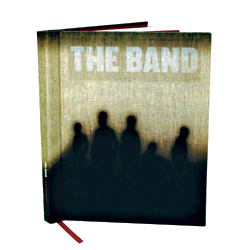THE BAND
A Musical History
(Capitol)
The high point of Martin Scorsese’s recent Bob Dylan doc, No Direction Home—besides the bits where we see Dylan perfect the mercilessly passive-aggressive attitude toward journalists that continues to haunt rock writers armed with dumbshit questions—is D.A. Pennebaker’s footage of Dylan onstage in Europe in 1966, backed by the Hawks, who later became the Band. It was during one of those performances that some hopelessly earnest folkie, enraged by Dylan’s abandonment of strict Greenwich Village folkways in favor of trashy rock and roll riffs, offered up to history his notorious damnation: “Judas!” he called Dylan, in a spasm of hyperbole not even Kurt Cobain’s followers could match 30 years later.
Hearing that nameless audience member’s outburst is pretty cool, as is hearing Dylan’s response, which he issued as an aside to the Hawks: “Play fucking loud!” What’s cooler than that, though, is hearing the Hawks actually do it. The moment allows you to see that what paved the way toward the Band’s eventual place in the rock pantheon was their creative agility, their ability to adapt to the needs of a particular musical moment within that moment.
That’s one of the reasons why few bands are as well suited to the box-set treatment as this ragtag bunch of Canadians (and one Arkansan). The material in A Musical History, a five-CD/one-DVD anthology compiled by guitarist and main songwriter Robbie Robertson, is chronologically sequenced, but that’s about all the order you’ll find here. Singles, album cuts, live recordings, sketches of songs-to-be—they’re all mashed together, an appropriate tack for a group that played American music: folk, rock, country, gospel, R&B, soul, funk, probably disco if they’d stuck around long enough. (In fact, keyboardist Garth Hudson began toying around with early synthesizers toward the end of the Band’s original incarnation, providing a peek at the surprises the 1980s could have held.)
Throughout the box—which per Robertson’s avowed distaste for awkward box sets in fact resembles a handsome coffee-table book—the song is the thing. Pre-Dylan, we hear them backing up early-’60s rockabilly shouter Ronnie Hawkins, behind whom they’re rowdy and raw (not to mention fucking loud). In a snatch of “Will the Circle Be Unbroken,” recorded in Saugerties, N.Y., the year before they made 1968’s Music From Big Pink, they’re respectful and delicate. With Dylan on The Basement Tapes, the group’s folk-rock turns dreamy, maybe druggy, reflecting the hothouse utopia they’d established but that had no chance of lasting. In midcareer stuff such as the appropriately joyous “Life Is a Carnival,” from 1971’s Cahoots, Allen Toussaint’s horn arrangement gives the band a witty swing that Woodstock hippies had to get hip to. And “The Night They Drove Old Dixie Down,” recorded live in San Francisco for The Last Waltz, remains singer-drummer Levon Helm’s tour de force, the sound of Southern pride (both real and imagined) interrogating itself.
Anchored by vintage Woodstock footage and some 1976 Saturday Night Live performances, the DVD’s nice, too—a welcome reminder that back then guys in bands rarely bothered shaving. MIKAEL WOOD
JAZZANOVA
The Remixes 2002–2005
(Sonar Kollektiv)
In my review of Gilles Peterson’s new compilations last week, I called out Berlin’s Sonar Kollektiv roster as the prime example of who Peterson’s crate-digging benefits: As the British tastemaker unearths one (relatively) ancient jazz and soul track after another, the new-school producers issue a modern one, seemingly trying to match history vibe for vibe. Twenty-first-century technology—like the pop and scratch of a needle on vinyl inserted postproduction—can blur eras, and the collective of producers/DJs called Jazzanova, who formed Sonar in 1998, seem to revel in making listeners scratch their heads. And sometimes critics, too—writer Ken Micallef commented, “Why it takes six grown men to make this . . . electro-funk Muzak . . . is a mystery.” I agree, because while it’s undoubtedly more interesting than, say, smooth jazz, this set of Remixes (preceded by the better Remixes 1997–2000) feels tossed off, exactly the sort of dinner-party background music Peterson’s recent comps surpassed. Something about the time frame of Remixes also feels off—just three years? The group tackles soul (Masters at Work ft. Roy Ayers’ “Our Time Is Coming”), gospel (Shaun Escoffery’s “Let It Go”), and bossa nova (Marcos Valle’s “Besteiras Do Amor”), but almost every song apart from a haunting dub of Calexico’s “Black Heart” is enveloped in warmed-over house and two-step, and drags on for six-plus minutes minimum. Forward-thinkers that Jazzanova are, though, they’ve included the link to an online mix and a blank CD on which to burn it. With over an hour of livelier, sexier sounds, it might just start the right kind of party. RACHEL SHIMP
Jazzanova play the Baltic Room at 9 p.m. Sat., Jan. 21. $12.




